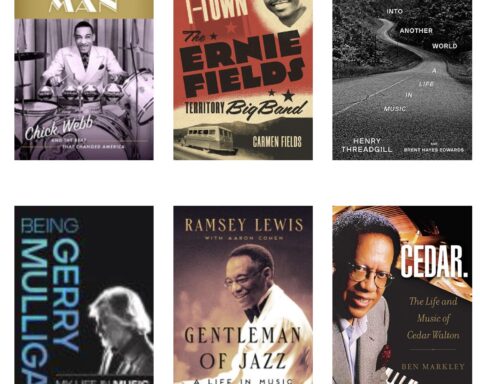
Ira Gitler, whose career over a stretch of seven decades encompassed virtually all the possibilities of working with and for jazz, died February 23 at age 90 after lengthy hospitalization for heart problems and other ailments.
A JJA Lifetime Achievement in Jazz Journalism honoree, a National Endowment for the Arts Jazz Master, co-editor with Leonard Feather of The Biographical Encyclopedia of Jazz, author of two books on bebop (Swing To Bop and Jazz Masters of the Forties reissued as The Masters of Bebop), New York editor of DownBeat during the 1960s, columnist for Swing Journal, radio show host on WBAI and a later show for a Colorado station, adjunct faculty at several colleges, and writer of more than 700 liner notes — beginning in 1951, when he was employee number two of Prestige Records’ small staff.
Gitler was born in Brooklyn, given early piano lessons by a cousin and turned on to jazz by his 12-year-senior brother Monroe. He took to the music avidly, writing his first published article — about Dizzy Gillespie on 52nd St. — for a school paper in 1946. During inconclusive semesters at University of Missouri he led record-listening sessions, scat-sang and played alto sax, sometimes going to jam sessions at nearby, historically black Lincoln University. Later he helped Annie Ross with her lyrics to “Twisted” and penned some sung by Eddie Jefferson for Horace Silver’s “Filthy McNasty”; wrote personalized birthday poems and, once, an all-verse program book for George Wein’s Newport in New York Jazz Festival’ and tried to meet everyone interesting in musical spheres and beyond (he was a fervent supporter of legally embattled comedian Lenny Bruce).
Gitler called the music as it struck him — especially early on, being blunt in criticism of works by Cannonball Adderley and Dave Brubeck, among others, but also vivid in description — coining”sheets of sound” to describe John Coltrane’s late 1950s style. Eventually, he came to focus his efforts on what he felt worthy of positive discussion. (Even so, he protected himself: after a lengthy visit in the early ’70s to Randy Weston in Morocco, he habitually wore a hand of Fatima pendant that had been given to him by a local elder, to bounce the evil eye back on whoever tried to cast it his way). He produced albums and concerts, including the Museum of Modern Art “Jazz in the Garden” sessions, in collaboration with his longtime friend Dan Morgenstern. He was also an accomplished sports writer, a lifelong fan of the New York Rangers ice hockey team who covered them from the press box, wrote classics on the sport and coach of award-winning amateurs, known as Gitler’s Gorillas.

“Ira was my oldest friend,” wrote Morgenstern, emeritus director of the Institute of Jazz Studies at Rutgers University, also an NEA Jazz Master and JJA Lifetime Achievement honoree, and Gitler’s editor at DownBeat in the ’60s, in an email. “I could not count the times we shared the music, live or recorded, that was our passion. He loved Charlie Parker and even took up alto—but soon decided this was not his strength, and took up a pen instead. Miles would laughingly reminisce about Ira telling him, ‘You ain’t playing shit,’ one of the anecdotal highlights from Ira’s long career in jazz. He was the dean.”
Gitler’s life was written up in DownBeat by JJA president Howard Mandel, at WBGO.com by Nate Chinen, in the Washington Post and The New York Times, in Jazz Wax by Marc Myers, by Mark Stryker on Ethan Iverson’s blog Do The Math. One of the most enlightening articles, though, is not online. That’s “An Apple Jam With Ira Gitler,” an interview conducted by Pawel Brodowski for Jazz Forum in 1989. Excerpts:
Jazz is a social music. I think that by knowing the musicians you know the music better. There is a danger that you become friendly with them, and then you have to write about them. And if you have to write something negative, it could be ticklish. But I think you’re better off if you’re friendly.
I like writers with a sense of humor. I think too many people in jazz take themselves so bloody seriously, and the music so seriously. It is a serious music, but one of the ingredients is humorPart of jazz is to uplift you and give you joy and laughter, to take you away from the mundane and ugly. I think a sense of humor is important, both in a musician and a writer.
Jazz enriches your life because of the music itself and the people you meet. If Jazz hasn’t made me a wealthy man, it’s taken me to Japan, Africa, Europe. I’ve been able to see all these countries, to meet people like you [Pawel]. I know people all over the world now. That’s what the music has done, besides the pleasure and support it gives me every day. When I play the music, it makes me feel better.
In that interview Gitler cited Al Cohn, Zoot Sims, Milt Hinton, Budd Johnson and Red Rodney as musicians he’d been particularly close to, but there were many more, across generations, as well as music journalists from Ralph J. Gleason and Stanley Dance to Gary Giddins (Gitler, Giddins and Francis Davis are onscreen pundits in Saxophone Colossus, Robert Mugge’s film about Sonny Rollins). He didn’t play his saxophone in public much, but did participate fearlessly in a “Critics’ Cobra” performance of John Zorn’s improvisational game piece, held at the original Knitting Factory in 1993. Child’s play to a gent who manipulated pucks with a stick, on skates.
Ira Gitler is survived by his wife of 46 years Mary Jo Schwalbach Gitler, his son and daughter-in-law, and twin grandchildren. Fitz Gitler is actively cataloging his father’s collections and archives.





My Aunt is an old friend of Mary Jo Schwalbach and is trying to contact her. Would you have any way to pass on that Florence Rosenblum would like Mary Jo to call her? Her # is 631 283 2284.
I want to find Mary Jo Schwalback Gitler. We worked together at MOMA in the 1960's. I have 3 peieces of her work & we were friends back then would so like to contact her again can you put me in touch with her or Fitz Gitler?? Thanks
Florence Rosenblum
Great article. I want to contact his wife, Mary Jo Schwalback the artist. We worked together at MOMA many years ago & I possess 3 or 4 pieces of her work. Can you give me an address or phone number or the address or phone number of her son Fitz?. If you have already replied my apologies if i missed it since I get so much email but would be so grateful for any lead you can provide. I know she would be delighted.
Flornce Rosenblum